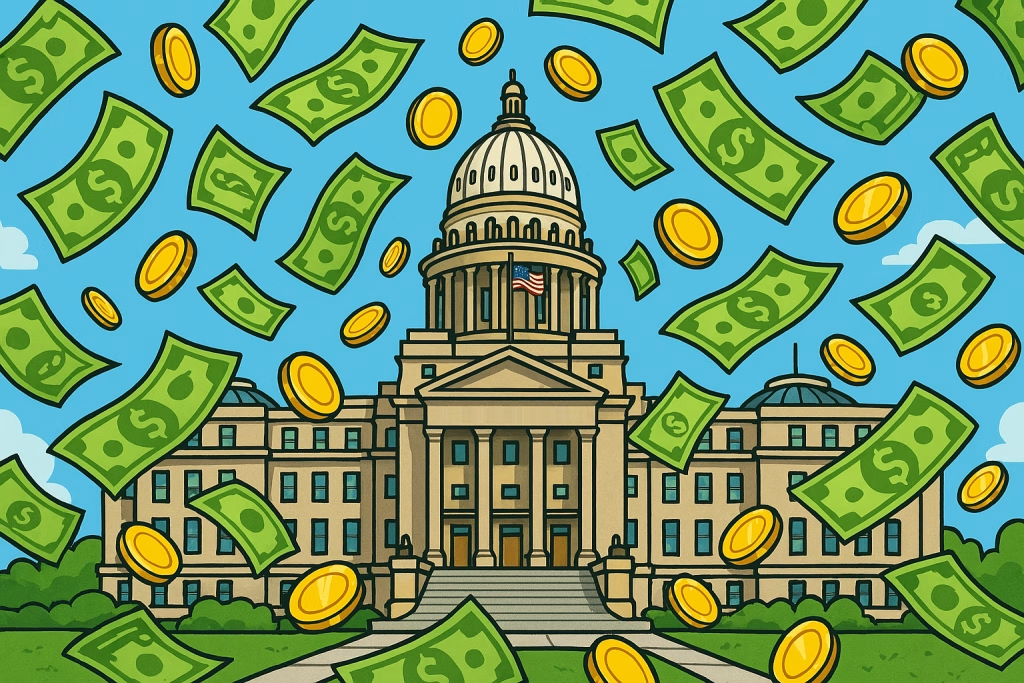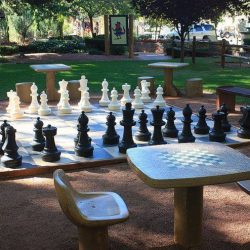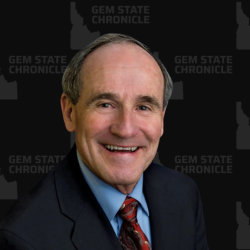One of the most striking philosophical debates on the political right is between idealists and pragmatists, that is, between those who have a vision of how society should be and those who attempt to deal with the world as it is. Most of the time, these two sides talk past each other. Each side faces its own temptation: idealists risk accomplishing nothing while impotently debating in ivory towers, while pragmatists risk completely compromising with the world as it is and forgetting that their job is to bring about political change.
I believe the best way forward is to walk the fine line between idealism and pragmatism; to have a vision for what can be while being effective in the world that is. Of course, this strategy risks angering hardliners on both sides — idealists accuse me of compromising too much, while pragmatists still see me as a right-wing extremist. C’est la vie.
Wayne Hoffman wrote a thoughtful critique of yesterday’s article, taking issue with my thesis that conservatives must understand how to govern well. I will always be thankful to Wayne for giving me my first job in politics and for long being a stalwart visionary for what society can be. It’s in the spirit of respectful dialogue that I offer this response to his critique. I encourage you to read the whole article, and of course come to your own conclusions.
I think it’s important to have idealists like Wayne and others who present a vision for what society can be, for what it should be. I often refer back to Ron Nate’s essay imagining an Idaho without Medicaid as a great example of setting an audacious goal that we should work to attain. When I was at Idaho Freedom Foundation, I remember often hearing Wayne lament that conservative think tanks thought too small, that they had become so comfortable working within the existing system that they had lost the ability to think outside the box. I continue to appreciate that reminder that we don’t have to simply accept the way things are.
The point of contention comes with the question of how do we get from the way things are to the way things should be? To use the example of Medicaid, once we set a goal to eliminate the program, how do we actually get there? That journey requires not only a plan to deal with those who have become dependent on the program, but enough political acumen to get a bill through the legislative process. Complaining that lawmakers lack the courage to do what you believe is right is akin to complaining that the 7-foot center keeps blocking your shots — it doesn’t change reality. It would be nice if the other team didn’t have a giant in the paint, but it does, so what do you do now? Lawmakers are beholden to many interests — lobbyists, donors, experts, and even voters who see things differently than you or I. Simply stamping our feet and demanding more courage is not going to get the job done.
We need idealists to show us what is possible, and we need pragmatists who can get us there. Ron Paul accomplished very little during his time in Congress, but he inspired thousands of people to get involved in politics with the goal of moving in the direction of more liberty. Where I believe idealism can go awry is when it becomes a substitute for doing the actual work of protecting liberty and our natural rights, and even acts as an impediment to those who are engaged in that work.
In his critique, Wayne Hoffman took issue with my claim that conservatives must learn to govern:
I so detest this line. The idea that it’s up to politicians to “govern” free people is maddening. No. I do not need to be governed. I do not participate in politics and public policy so that I can choose folks to “govern” me. The reason I vote for “conservatives” or “libertarians” is because I intend to be completely ungovernable, and I select candidates that are least likely to want to manage my affairs and those of my neighbors.
This is a very libertarian position, and one I feel as well. I don’t like the idea of other people having a say over how I live my life. Homeowners associations are perhaps the most obvious example of how your neighbors can control what you do with your own property. I agree, it’s maddening.
However, it’s the world we live in. If conservatives abandon the field of government, it will be left by default to leftist would-be totalitarians. Wayne is coming from the idealistic perspective, while I’m giving voice to the pragmatic. For sure, the libertarian ideal of little to no government where we all live our lives in peace and harmony with each other would be great. But that’s not the world we live in. That doesn’t account for human nature.
In his essay, Wayne Hoffman lamented that legislators in the 2025 session were content to continue leftist programs:
They believe that it is their job to demonstrate their capacity for governing, namely to carry on with the policies of their predecessors. If the leftist legislators of yesteryear enacted a big government program or law, they argue, it is their job to continue those policies but manage them in a more right-of-center way.
I disagree. It is not the government’s job to provide me with free or reduced cost housing, food, clothing, or medicine. It is not the government’s job to pick businesses to favor with special tax breaks and incentives. It is not the government’s job to make decisions for me and make me safe from bad choices. It is not the government’s job to help me get ahead or stay ahead. It is not the government’s job to plan the lives of my kids or grandkids so that they might choose a profession or where they might live.
I don’t disagree with this at all, and I want to clarify that by govern I don’t mean that conservatives should be afraid to undo leftist programs. Of course we should support rolling back a government that has far out-stepped its proper role in society. The question is how to do that. The point I was trying to make yesterday is that you need to know how to use the machinery of government if you want to accomplish anything in the political realm. Do you want to repeal Medicaid? Do you want to end subsidies and tax breaks for big businesses? Do you want to stop the government from making decisions for the people? Then you have to know how to get legislation passed. That’s what I meant, and I believe that’s what Aaron Renn meant in the video that inspired yesterday’s article.
Wayne concluded the free section of his essay by saying that the thing keeping us from an ideal world is courage:
It’s not the world we live in because we lack the imagination or courage to charge the hill toward a different possible outcome. Even with a supposedly “conservative” legislature, Idahoans aren’t really very free. Until we understand the point of lawmaking — it’s not to govern, not to regulate flags, not to use power of government to chain the people who piss us off — we’ll never truly give people the type of government our founders intended.
Once again we run into the conflict between seeing things the way they should be versus admitting the way things are. It’s the difference between prescription and description. It would be great if we had 105 legislators and a governor who held to the classical liberal view that government should be limited to protecting life, liberty, and property. But we don’t, so now what do we do?
Many modern libertarians and anarchists go further, suggesting that not even our Founding Fathers properly understood the role of government. They present a vision of a world without government at all, where people live in harmony with each other. I think that is a mistake, and it can cause us to lose sight of the actual purpose of government. I want to expound on what I believe is the proper role of government, and address what I believe are faults in libertarians positions regarding that role. From this point onward I’m not necessarily responding to Wayne directly, but his essay brought these things to mind.
With respect to my libertarian-leaning friends, I believe they make the same fundamental error with regard to human nature as socialists. Both groups deny the basic truth that human beings are frail and fallible, and where socialists believe we can somehow eliminate greed and dishonesty, libertarians believe we can eliminate any facet of human nature that would cause one person to behave badly toward another. Who enforces the non-aggression pact, anyway?
The libertarian ideal springs from the original ideas of individual rights as defined according to classical liberalism, which has been the default political philosophy of our nation from the beginning. However, classical liberals such as our Founding Fathers still recognized a fundamental truth that I think modern libertarians miss: We live in a society. Man is not a solitary creature and never has been. There is always some form of society — family, clan, tribe, nation — and that society requires some level of governance.
“Government” is not a bad word in and of itself. Nations have governments. Sewing circles have governments. Families have governments. The question is not whether we will have a government, but what form will that government take, and how much power will it have.
Conservatives like to quote Ronald Reagan as saying “Government is the problem.” He was right, of course, but as always we must look at the full context of his remarks. Reagan’s 1981 inaugural address came at a time of economic stagnation, inflation, and high unemployment. In electing him, the American people had rejected the government-first ideas of the Democratic Party. Reagan addressed the crisis thusly:
The economic ills we suffer have come upon us over several decades. They will not go away in days, weeks, or months, but they will go away. They will go away because we as Americans have the capacity now, as we’ve had in the past, to do whatever needs to be done to preserve this last and greatest bastion of freedom.
In this present crisis, government is not the solution to our problem; government is the problem. From time to time we’ve been tempted to believe that society has become too complex to be managed by self-rule, that government by an elite group is superior to government for, by, and of the people. Well, if no one among us is capable of governing himself, then who among us has the capacity to govern someone else? All of us together, in and out of government, must bear the burden. The solutions we seek must be equitable, with no one group singled out to pay a higher price.
We hear much of special interest groups. Well, our concern must be for a special interest group that has been too long neglected. It knows no sectional boundaries or ethnic and racial divisions, and it crosses political party lines. It is made up of men and women who raise our food, patrol our streets, man our mines and factories, teach our children, keep our homes, and heal us when we’re sick — professionals, industrialists, shopkeepers, clerks, cabbies, and truckdrivers. They are, in short, ”We the people,” this breed called Americans.
Reagan was not arguing for no government, but for a return of a government by, for, and of the people. The post World War II liberal world order has been one of technocracy, of so-called experts who believe themselves more equipped to rule over us than we are ourselves. Has it gone too far? Of course. Yet beware throwing the baby out with the bathwater. For example, I doubt many conservatives want to return to a time before the Pure Food and Drug Act mandated that food be properly and accurately labeled, though perhaps a few libertarians think that’s a good idea. Yet again, we take it for granted that we can make informed choices about what we eat without worry that a can labeled tuna is not actually salted rat.
Government is not going away, not as long as humanity continues to exist. The question before us, then, is how to structure government in a way that maximizes freedom. Even that word must be properly defined. Some strains of libertarians see freedom as the ability to do whatever you want — that’s why so many proponents of drug use are drawn to the Libertarian Party. Yet our Founders, and many of the political philosophers throughout history, had a different view of freedom, one that encompasses our responsibilities as well. Patrick Henry did not say “give me liberty or give me death” because he wanted to smoke weed in peace; but because he believed the British government had gone beyond its moral boundaries and was infringing upon the natural rights of life, liberty, and property of the colonists.
Again, the idea that we should all be perfectly free of anyone telling us how to live sounds great, but it’s never been the case in all of human history. The libertarian ideal is just as fleeting as the socialist one — has “real libertarianism” actually been tried? Human societies have always had some form of rulership, whether a clan patriarch, a tribal chieftain, a king, a council of elders, or an elected parliament.
How you approach the necessity of government, or lack thereof, depends on your basic worldview. Are human beings naturally good, and only become corrupt because of society, or are we naturally evil, and need social structures to restrain our worst impulses? This is a question that has been debated for many centuries. Christians believe the latter, that when left to their own devices humans will choose to do evil. St. Paul wrote in the epistle to the Romans that governments were instituted by God to punish evildoers:
Let every person be subject to the governing authorities. For there is no authority except from God, and those that exist have been instituted by God. Therefore whoever resists the authorities resists what God has appointed, and those who resist will incur judgment. For rulers are not a terror to good conduct, but to bad. Would you have no fear of the one who is in authority? Then do what is good, and you will receive his approval, for he is God’s servant for your good. But if you do wrong, be afraid, for he does not bear the sword in vain. For he is the servant of God, an avenger who carries out God’s wrath on the wrongdoer. Therefore one must be in subjection, not only to avoid God’s wrath but also for the sake of conscience. For because of this you also pay taxes, for the authorities are ministers of God, attending to this very thing. Pay to all what is owed to them: taxes to whom taxes are owed, revenue to whom revenue is owed, respect to whom respect is owed, honor to whom honor is owed.
Romans 13:1-7 ESV
Our Founding Fathers believed that some form of government was necessary to protect the natural rights of the people. Building on centuries of English political philosophy, Thomas Jefferson wrote his thesis in the Declaration of Independence:
We hold these truths to be self-evident, that all men are created equal, that they are endowed by their Creator with certain unalienable Rights, that among these are Life, Liberty and the pursuit of Happiness. — That to secure these rights, Governments are instituted among Men, deriving their just powers from the consent of the governed.
When I hear conservatives and libertarians denounce the very idea of governing I have to shake my head. There will always be some form of government, because that is the nature of mankind. The idea that we can do away with every social structure seems to grow from the idea of the noble savage, of man living in a perfect state of nature before the ideas of society and government were somehow imposed upon him. This too is an old idea, with roots in antiquity. Consider how the Roman author Tacitus described the German barbarians, comparing them favorably to the decadent Romans:
Thus with their virtue protected they live uncorrupted by the allurements of public shows or the stimulant of feastings. Clandestine correspondence is equally unknown to men and women. Very rare for so numerous a population is adultery… No one in Germany laughs at vice, nor do they call it the fashion to corrupt and to be corrupted.
This idea of man being a perfect being who was only corrupted by the constraints of society became extremely popular during the Romantic Era. One of my favorite poets, William Blake, wrote thus:
I went to the Garden of Love,
And saw what I never had seen:
A Chapel was built in the midst,
Where I used to play on the green.And the gates of this Chapel were shut,
And ‘Thou shalt not’ writ over the door;
So I turn’d to the Garden of Love,
That so many sweet flowers bore.And I saw it was filled with graves,
And tomb-stones where flowers should be:
And Priests in black gowns, were walking their rounds,
And binding with briars, my joys & desires.
Yet this romantic ideal, just as the libertarian ideal, is a mirage. In reality, man in the state of nature is a savage. This ideal can only survive when built atop an existing society where men take for granted that a government exists to punish evildoers. Most of us go about our lives taking for granted the social structures put in place by previous generations. We can plan a trip knowing that roads will take us where we want to go, we can post a letter with confidence that it will get to its destination, we can walk the streets without fear of being mugged, assaulted, or murdered. We live in a comfortable bubble, one that allows us the luxury of philosophizing. A society with no formal government would not resemble utopia, rather it would look more like Somalia, or El Salvador just a few years ago.
El Salvador provides a fascinating case study for the contrasts between idealism and pragmatism, between the libertarian ideal and reality of governance. Before Nayib Bukele was elected president, the country had one of the highest murder rates on earth. Men, women, and children lived under the shadow of constant violence as MS-13 and other gangs terrorized and extorted the citizenry. Once in office, Bukele has used extraordinary measures to crack down on the violence and rebuild his country. American and European publications have called him a fascist for doing so, chiding him about his lack of respect for democratic norms. Yet his programs have been effective, turning El Salvador into one of the safest places in the world. It turns out that throwing the bad guys in prison makes for a safer society.
Would libertarians argue that the people of El Salvador were more free prior to Bukele cracking down on the gangs? Prisoners and accused criminals might have had more due process, but regular people lived 24/7 in fear of violence and murder. It’s a conundrum, because it puts to lie the idea that man in a state of nature will default to peace and harmony.
Even hardcore libertarians agree there must be some form of government, because there must ultimately be a third party to adjudicate disputes between people. Even in an ideal libertarian society, two homeowners who have a dispute over a property line must take their case to someone whose judgment they will both respect. Whomever judges that case must have a standard to which to appeal in making that judgment.
That is government, multiplied many times over. What about resources like water? If you dig a well on your own property and use much more than your fair share of water, do your neighbors who are now deprived have any recourse? Who decides a fair share? The most equitable solution is some sort of association made up of the people involved — everyone who has claim to the water in that aquifer — which means, congratulations, you have invented representative government.
Where Wayne and I and nearly all conservatives agree is that government currently far oversteps its proper role. However, we must properly define our terms before continuing the discussion. Some libertarians argue for no government at all, complete anarchy. Michael Malice is a self-described anarchist (I believe he eschews the libertarian label) who makes cogent arguments for having no government at all. Yet that is not the position of most conservatives.
When conservatives argue for small government, I believe what they are really arguing for is limited government. After all, small does not necessarily equal good. A dictator with absolute power is a very small government, but such a man will almost surely infringe upon your natural rights. If you agree, as most conservatives do, that government does have proper roles, then that implies it should have the authority and resources to govern within those constraints.
That was how our Founding Fathers constructed our government. While I suspect many libertarians might wish the Anti-Federalists had won the debate over the Constitution, leading to a small central government and leaving the bulk of authority up to the states, that’s not what happened, and we live in the world our ancestors created. The Constitution is the law of the land, and it has been amended and reinterpreted many times over to arrive at the point we find ourselves today.
You could argue that you as a person never signed the Constitution, and you had no say in the laws that you must now live under, and that is true. However, that is just a fact of life. Denying that fact can easily take you down the sovereign citizen road, which often leads to a jail cell. Right? No, but it is what it is.
The way our Founding Fathers chose to structure our government was built on centuries of English political philosophy that developed the concept of individual natural rights. The idea that rulers should be constrained by abstract principles such as natural rights is not obvious; we only think it is because it’s the water in which we swim. Magna Carta, signed in 1215, was a revolutionary document in that it laid down for the first time restrictions on the power of the king. Until then, the idea of kings having limits was thought to be absurd. Consider the warning of Samuel when the people of Israel demanded a king:
So Samuel told all the words of the Lord to the people who were asking for a king from him. He said, “These will be the ways of the king who will reign over you: he will take your sons and appoint them to his chariots and to be his horsemen and to run before his chariots. And he will appoint for himself commanders of thousands and commanders of fifties, and some to plow his ground and to reap his harvest, and to make his implements of war and the equipment of his chariots. He will take your daughters to be perfumers and cooks and bakers. He will take the best of your fields and vineyards and olive orchards and give them to his servants. He will take the tenth of your grain and of your vineyards and give it to his officers and to his servants. He will take your male servants and female servants and the best of your young men and your donkeys, and put them to his work. He will take the tenth of your flocks, and you shall be his slaves. And in that day you will cry out because of your king, whom you have chosen for yourselves, but the Lord will not answer you in that day.”
1 Samuel 8:10-18 ESV
Indeed, the prophet Elijah condemned King Ahab for murdering Naboth to steal his vineyard, not because it was illegal, but because it was wrong. Kings were essentially gods among men, and even medieval Europeans believed that kings had divine right to rule as they wished.
The idea of limited government grew out of many centuries of political philosophy; it’s not something that was obvious for most of human history, yet we take it for granted today. The fact that our government has gone beyond its limits and desperately needs reform does not mean that the solution is to eliminate government entirely. The truth is that no form of government will last forever, because governments are made of fallen people. Monarchies and republics alike eventually find themselves in a downward spiral of corruption and inefficiency. It’s worth asking where corruption came from in the Romantic ideal of the noble savage. Societies are simply groups of people, so how could society corrupt an uncorrupted being?
James Madison understood this paradox, that fallen men need government to keep them in line, but governments are made of those very fallen men. He laid out a solution to this paradox in Federalist 51:
Ambition must be made to counteract ambition. The interest of the man must be connected with the constitutional rights of the place. It may be a reflection on human nature, that such devices should be necessary to control the abuses of government. But what is government itself, but the greatest of all reflections on human nature? If men were angels, no government would be necessary. If angels were to govern men, neither external nor internal controls on government would be necessary. In framing a government which is to be administered by men over men, the great difficulty lies in this: you must first enable the government to control the governed; and in the next place oblige it to control itself.
Notice how Madison’s solution does not involve eliminating government. He was wise enough to know that something always fills the vacuum, as MS-13 did in El Salvador, as cartels have in Mexico, and as warlords did in Somalia. Instead he helped design a government that used the truth about human nature to check itself rather than assuming human nature could be curtailed. “Ambition must be made to counteract ambition,” he wrote. The genius of our Founding Fathers was in separating the concept of governance from that of rulership. In their eyes, government was supposed to be a service to the people, not a means to aggrandize oneself.
On the other hand, how do libertarians handle the problem of human ambition? I saw a tweet by Parrish Miller as I was writing this essay. He quoted Henry David Thoreau who said:
I heartily accept the motto, — ‘That government is best which governs least;’ and I should like to see it acted up to more rapidly and systematically. Carried out, it finally amounts to this, which I also believe, — ‘That government is best which governs not at all;’ and when men are prepared for it, that will be the kind of government which they will have.
This quote comes from Thoreau’s essay Civil Disobedience, which urged people to stand up to unjust laws. Thoreau was especially angry about the Mexican War and the institution of slavery. It seems ironic to me that Thoreau’s original purpose for writing the essay was as a polemic against people he saw as ineffectual, yet in the end it was not civil disobedience that ended slavery but the blood of 600,000 American soldiers. Ivory tower, indeed.
Notice also that Thoreau’s entire premise depends on changing human nature: “…when men are prepared for it…” Also remember that Thoreau’s other famous work, Walden, lauds the idea of living in harmony with nature despite the author himself outsourcing his clothes washing duties to his mother and often relying on neighbors for supper. Once again, we only have the freedom to imagine life without government because we live in a society with a preexisting structure. Most of us have never actually experienced a life of total anarchy and the total freedom it brings, and I suspect most of us would prefer to live in our current society if we did.
Civil Disobedience proved to be an inspiration to nonviolent resistors such as Mahatma Gandhi and Martin Luther King Jr. However, once again we have to place their resistance in the context of the societies they lived in. Had Gandhi done what he did in modern Iran, or King fought for civil rights in Communist China, both men would likely have been summarily executed and their struggles have been for naught. It’s only because of the philosophy of freedom that permeates the English and American systems that either were able to accomplish anything at all.
All that said, I appreciate and enjoy Thoreau’s perspective on mankind and government, and I found a lot of wisdom in reading Walden. I believe we need idealists like that to remind us of what is possible. We need the Wayne Hoffmans, Ron Nates, and Parrish Millers to give us a vision toward which to strive. However, we must be cognizant of the pitfalls between where we are now and where we want to be. That is why I wrote yesterday’s article, and why I believe conservatives must learn how to govern if we are to effectively move our society in the direction we want it to go.
I believe that much of our modern political conflicts stem from a gradual breakdown of our society. In the time of our Founders, men and women were subject to multiple spheres of authority. A man was accountable to his family, to his community, to his church, and eventually, very far up the chain, to his government. Fast forward to 2025, and all of those spheres of authority have been erased, save that of government:
- No fault divorce allows men or women to break the bonds of family with nothing more than a signature on a paper.
- The proliferation of churches means you can join a new one, or even cease attending altogether, if you dislike what your preacher has to say.
- Communities have become so diffused, sometimes even moving entirely into the online world.
Now, the only authority left is the state, and so we are tempted to look to the state to fill the roles that were once properly filled by other spheres:
- In 1800, a man who cheated on his wife would likely face sanctions from his family, his church, and his community. Today, that same man can avoid any accountability, unless his wife asks the government to extract resources from him in the form of alimony or child support.
- In 1800, men looked to churches and communities for moral instructions; now we expect the government to do it through public schools.
- In 1800, men could go most of their lives without interacting with government at all, but today, government has grown too large, too expansive, too powerful, and too invasive.
On that last point we all agree. The only question is what do we do now? Do we continue lamenting the situation in our ivory towers, or do we train up an army of political activists, legislators, and staffers who will move us in a direction of more limited government and more freedom?
Wayne longs for the day when we will have the government our Founders intended, but there’s no moving backward. We cannot simply blink our eyes and wake up in 1800 again, with it’s social structures, spheres of authority, and small government. Indeed, if you transported a modern conservative back to that time I believe he would find it much different than the picture we have in our minds.
In any case, today we must deal with a nation of 350 million people, in a world facing new challenges every day, with technology that has radically changed the way we live over the past two centuries. I do not believe the answer is totalitarianism or an all-powerful government; I believe our natural God-given rights remain the same no matter the time or place. So the question, once again, is how do we arrive at the future we want?
I believe that we need idealists to point the way and pragmatists to figure out how to get there. I’m more optimistic than Wayne regarding the 2025 session — I believe it took significant steps in the right direction — but we cannot be complacent. We have a shared goal of limiting government and expanding freedom, so let us keep working together toward it every day.
Make sure to subscribe to Wayne’s Substack, where he always writes thought-provoking posts. Subscribe to my Substack too to get daily articles in your mailbox. Usually it’s commentary on local politics, but I appreciate your indulgence for longer philosophical essays once in a great while.
About Brian Almon
Brian Almon is the Editor of the Gem State Chronicle. He also serves as Chairman of the District 14 Republican Party and is a trustee of the Eagle Public Library Board. He lives with his wife and five children in Eagle.













